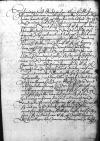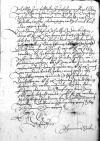Ewer Furstlichen Gnaden ⌊⌋ aus ⌊Lobaw⌋, den XIten tag Ianuarÿ, / hab ich in ⌊Hispanien⌋ / vorlanngst empfanngen / unnd fueg darauf Ewer Furstlichen Gnaden unnderthanigklichen zuvernemen, / das ich auf VI diß monats Iulÿ / wol unnd mit lieb, / Got hab lob, / aus Hispanien / alher gen ⌊Augspurg⌋ komen, / unnd am herauß reitten / bin ich auf Ewer Furstlichen Gnaden begeren / beim ⌊geshlacht⌋ gewesen / unnd der järlichenn pennission halb / mit ir gehanndelt, / die mir dann zu anntwurt geben, / sÿ seÿ nicht zufriden, / das man ir järlichen / ain genannt gelt gebe, / sonnder ir unnderthanig beger ist, / daz Ewer Furstliche Gnaden / ir ÿetzt bis in zwaÿhundert ducaten / auf ain mal mit ainander genedigklichen zuestellenn / lassen wellen. / Mit denselben zwaÿhundert ducaten ist ⌊sÿ⌋ willenns, sich in ain klosster zuthon, / unnd also ir lebennlanng / zu irer leibsnotturfft ain auskomen erlanngen. / Das acht ⌊sÿ⌋ fur Ewer Furstlichen Gnaden, / auch fur sÿ selbs, / das best unnd nutzist sein. / Hat meins achtenns die sach nit unrecht vor ⌊ir⌋, / unnd gedeichte mich solhs von Ewer Furstlichen Gnaden, / dieweill sÿ mit an II C-o ducaten aller ding zufridenn / unnd sich also hindan ferttigen lassen, wol zuthon sein. / ⌊Sÿ⌋ wil auch, wa Ewer Furstliche Gnaden ir solh begernn gnedigen bewilligen, die ⌊Joanica⌋ alsdann / von ir lassen, / unnd sonnst nit, / die welhe Joanica hab ich ganntz gesundt / unnd wol mugendt gefonnden. / Hiemit ain brief / von dem ⌊geshlecht⌋, / an Ewer Furstlichen Gnaden gericht, darinnen on zweifel / dieselben Ewer Furstlichen Gnaden / obstennde ir mainung unnd furnemen / auch vernemen werden. / Daruber mag Ewer Furstlichen Gnaden thon oder lassen nach derselben gefallen / unnd mich solhs wissen lassen. / Unnd was ich alsdann / darinnen Ewer Furstlichen Gnaden zu gefallen thon kan, / wil ich in solhem willig erfonnden werden. /
Unnd dann betreffennt das matzißöll, / wil ich hoffen dessen noch an 8 in X pfund zubekhomen. / Unnd wiewol ich das hievor umb funf guldin daz pfund kaufft, / so wil ich doch vleiß fur keren / unnd sehen, / das ich das umb zwen in dreÿ guldin erlanngen mug, / darumb Ewer Furstlichen Gnaden mich wissen lassen, / ob unnd wievil / pfund Ewer Furstlichen Gnaden dessen begern / unnd haben wellen. / So wil ich alsdann solhs den herrn ⌊Fuggern⌋ alhie Ewer Furstlichen Gnaden zuetzusennden uberanntwurtten. /
Verrer, so bitt Ewer Furstlichen Gnaden ich nochmalen, wie vor das dieselben, / mit dem begertten bellzen / unnd deckhin / mein nit vergessen / unnd fur mich kauffen / unnd hersennden lassen wellen. / In sonder, dieweil es sich gegen dem wÿnntter nachnet, / so mocht ich solhs zum beldesten zugeshehen / vast wol leiden unnd solhs nun dem ⌊Jörgen Heglin⌋ zu ⌊Crackhaw⌋ zuesennden. / Der wirt mir die fortter wol zubestellen wissen. / Dargegen wil ich mich auch der gepur halten. /
Unnd dann, so befind ich alhie in den buechern, / das Ewer Furstliche Gnaden den herrn ⌊Welsern⌋ schuldig beleiben, nämlich ainhundert unnd siben gulden, / zehen schilling, dreÿ pfening / reinsch in gold laut ains chonnto hiemit, / wie Ewer Furstliche Gnaden sehen werden. / Si haben bei den herrn ⌊Fuggern⌋ alhie in sonnder der funffzig ducaten halber anforderung gethan. / Es ist inen aber zu antwurt geben worden, / das sÿ weder von Ewer Furstlichen Gnaden, / noch von anndern bevelh haben, / ainich gelt / von derselben wegen ÿemants ichts zubetzalen, / derhalben an Ewer Furstlichen Gnaden nochmalen ir underthanig begern, / die wellen nochmalen beÿ den herrn ⌊Fuggern⌋ oder anndern verfuegen, das inen solh gelt betzalt werde. / Ewer Furstlichen Gnaden unnderthanigklichen zugedienen bin ich allezeit ganntz willig. /
Herr ⌊Johann⌋ bishove zu ⌊Culmen⌋ etc. unnser genediger herr soll unns a die 14 Junio 1533 aus der rechnung vom spanischen hof haben die unnsern alda / a die 15 Febrer paxato / auf seiner furstlichen gnaden schreiben der ⌊Ÿsabel Delgada⌋ zalt 12 ducaten. Tuet zu reinishem gold gerait floren 16 szilling II ducaten 2. A die 15 Luÿo 1534 / noch aus der rechnung vom spanishen hof setzen die unnsern alda a die 27 Aprill paxato fur ausgeben 24717 maruedis. / Sovil ist sein furstliche gnaden inen shuldig, nämlich maruadis 18750 fur 50 ducaten. / Haben sÿ alda auf Ewer Furstliche Gnaden bevelh / der ⌊Isabell Delgada⌋ zalt. Rest maruedis 5967 seindt umb 16 canteros weiß wein von ⌊Sand Martin⌋, / im auf ⌊Annttorff⌋ zuegesannt, / nämlich kost er erst kaufs 2720 und 5 leder, darinn der wein ist, 750 maruedis, / und dann die fuer von ⌊Madridt⌋ geen ⌊Bilbaw⌋ 2497 maruedis. / Thuet zusamen wie ob. / Thondt zu 138 floren reinisch gold fur 100 ducaten gerait.
Reinische ffloreno 90 szilling 19 ducaten I.
Suma reinische ffloreno 107 szilling 10 ducaten 3.
I C-o VII gulden X szilling III ducaten
⌊Barthlome Welser⌋ und geselshafft.




